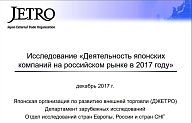There is a record high percentage of respondents expecting an improvement in the situation with operating profit in 2017. At the same time, competition is expected to worsen, the problem of personnel hunger comes to the fore, etc.
1. The share of enterprises predicting an «active balance» of operating profit continues to grow and reached 66.3%, which is a record figure for the last five surveys. (Section Operating Profit Perspectives)
2. There are more and more expectations that business will expand. Japanese companies aim to employ local staff. (Section Further Business Development)
3. In the light of the recovery of market conditions, the issue of competition comes to the fore. (Section Business Problems)
4. The way to import substitution affected the activities of Japanese companies in Russia. (Section Investment Climate)







